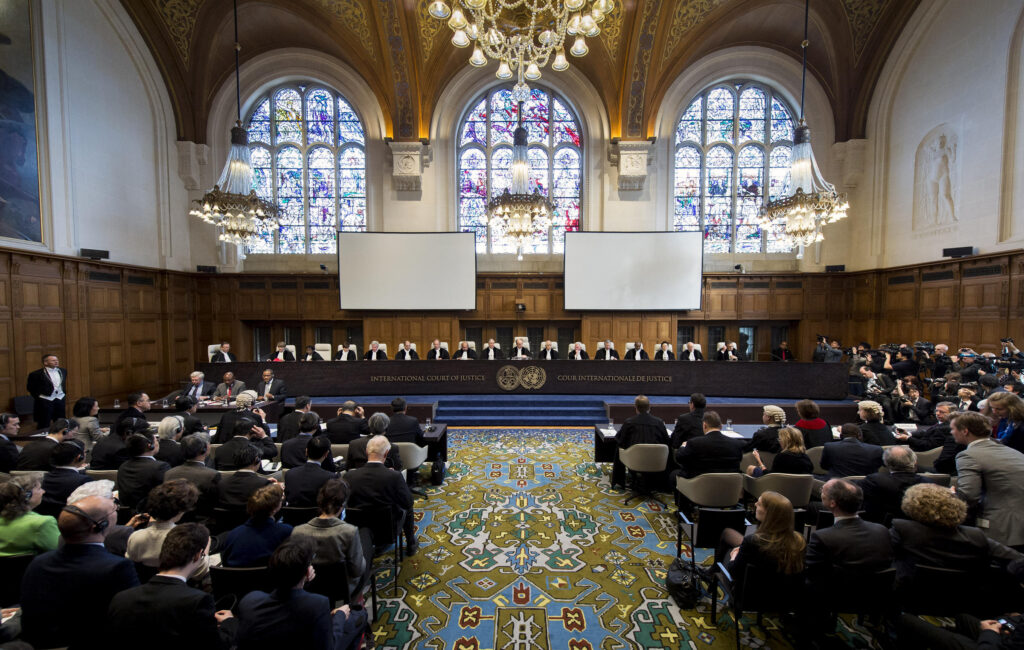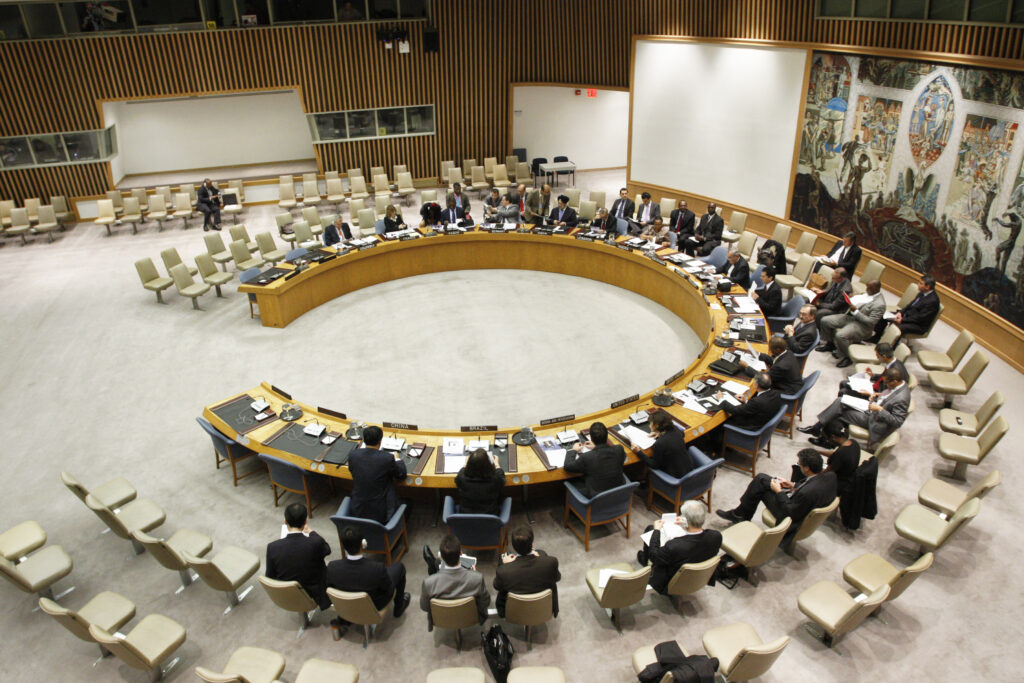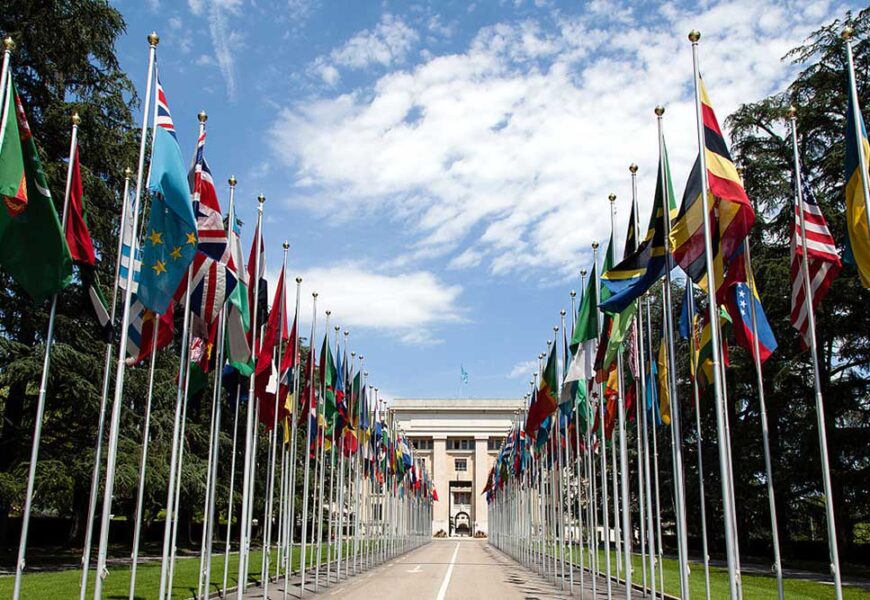Global Cooperation: How International Law and Organizations Shape the Future of Our World
KEY TAKEAWAYS:
- International law and organizations foster global cooperation and tackle shared challenges.
- Improve treaty effectiveness through universal ratification, flexibility, monitoring, and public engagement.
- Address contemporary challenges like cybersecurity, climate change, and global health through necessary reforms.
- Strengthen enforcement and compliance mechanisms for upholding the rule of law.
- The synergy between international law and organizations creates a more peaceful and interconnected world.
The role of international law in establishing global governance is important in today’s interconnected world. International treaties and organizations play a crucial role in developing an inclusive and collaborative international society by solving major transnational concerns and encouraging collaboration among states. To provide uniformity and predictability on the worldwide stage, institutions like the United Nations, the World Trade Organization, and the World Criminal Court have been established. Treaties establish the groundwork for cooperative action and describe the rights and duties of the signature parties, addressing issues such as climate change, human rights, commerce, and disarmament.
The United Nations, the World Trade Organization, and the International Criminal Court are all examples of international institutions that help nations work together more effectively.
These forums allow countries to debate issues of mutual interest, pool resources, and collaborate on approaches to common problems. International law and organizations also provide a forum for nations to settle differences without violence, decreasing the likelihood of war and fostering an international system based on peaceful negotiations.
However, international law and organizations are often criticized for their potential to erode independence because of their challenges in uniformity and enforcement. More than ever, the world needs international law and organizations to define global governance in the face of interrelated challenges like climate change, pandemics, and cyber threats.
This article discusses the influence of international law on the world’s future by analyzing the historical background of international treaties, the functions of international organizations, the pros and cons of global governance, and the potential of international law to shape our shared global destiny.
Concept and Scope of International Law
International law governs relationships between sovereign states, international organizations, and well-known international players. International law has a wide scope, encompassing issues such as human rights, the economy, trade, space law, and the functioning of international organizations. It allows for more predictability and stability in international relations by providing normative norms, processes, and a common conceptual language to deal with the complexities of international interactions.
International Law and Its Functions
International law centers on a rules-based framework that regulates the acts of nations and international entities. It establishes a structure for dealing with differences, addressing shared problems, and encouraging international collaboration. Independent of national legal systems, international law is binding on all nations in the international community.
International law is notable for its capacity to change and develop over time. International law was initially intended to control solely the activities between sovereign governments, but it has now been expanded to cover individuals and non-governmental organizations.
Human rights, environmental protection, and humanitarian law are just some of the topics brought under its broader umbrella.
The promotion of global governance and the resolution of transnational difficulties are two additional functions of international law. It promotes a sense of common purpose in international affairs through easing diplomatic communication, commercial agreements, and collaboration on subjects of mutual interest. International law allows states to cooperate and work towards collective solutions, whether establishing treaties or regulating behavior during armed conflict.
The Evolution of International Law Throughout Time
Treaties and agreements between sovereign bodies are historical practices that laid the groundwork for modern international law. For instance, the Peace of Westphalia in 1648 was a watershed moment in the development of international law because it established the concept of state sovereignty and non-interference in domestic issues.
With the help of diplomatic conferences and the formation of international organizations, international law made great strides forward in the nineteenth and twentieth centuries. The Vienna Congress of 1815 and the Hague Conferences of 1899 and 1907 are among the founding documents of modern international law.
There has been significant progress in building the rule of law between states and encouraging international collaboration since the formation of the League of States following World War I and the United Nations in 1945. These groups facilitate international communication, collaboration, and decision-making.
International law will evolve to handle global issues for as long as they exist. International legal frameworks need to be reviewed due to globalization, technological advancement, and the emergence of new challenges. Regulation of cyberspace and AI will be among the many new areas of international law that will develop in response to the needs of the world’s population.
International law is a cornerstone of global government because it establishes norms for interstate relationships, regulates international disputes, and encourages states to uphold universal principles. International law has remained relevant because of its flexible framework and long tradition of precedent.
International Treaties: Framework for Global Cooperation

International treaties are crucial instruments to promote global collaboration and regulate international relations. Treaties are crucial in tackling transnational concerns and achieving shared objectives because they are legally binding agreements between sovereign nations or international organizations. This article delves into the complex procedures of treaty formulation and negotiation to examine the significance of treaties in the international arena.
Treaties’ Role in Keeping International Relations in Check
Treaties provide a framework for international collaboration, coordination, and collective action on transnational concerns. These pacts aid in forming a rule-based international order, increasing predictability and stability in diplomatic dealings.
Human rights, environmental protection, arms control, and trade laws are all bolstered by international treaties. Treaties encourage accountability among signature parties by establishing explicit pledges and duties, guaranteeing that governments stick to the agreed-upon provisions. They also provide a mechanism for holding countries accountable for violations, which boosts compliance and confidence in the international community.
Formation and Negotiation of Treaties
Treaty development and negotiation are lengthy and complex processes. To achieve this goal, all parties involved must engage in extensive rounds of consultation, negotiation, and diplomatic activity. Prenegotiations are prevalent in the first stage, and they help the parties find common ground before the actual treaty discussions begin.
After deciding that a treaty is necessary, the two sides’ representatives will meet and begin discussing the agreement’s details. These discussions might happen at international summits, bilateral talks, or conferences. This may be a lengthy procedure since both parties must consider the possible outcomes of each phrase.
Each party’s rights, responsibilities, dispute resolution, and enforcement procedures must be worked out throughout the negotiating process. The objective is to find common ground and reach concessions on controversial issues so that everyone’s needs are met.
After the parties agree, attorneys prepare and review the treaty’s language to ensure accuracy and clarity. Each signatory nation must go through domestic approval processes for the final wording. There may be some treaties that require parliamentary approval or ratification through a national legal process, but this varies from nation to nation.
The authorized representatives of both sides then sign the treaty when it has been ratified. The treaty’s signing is significant since it shows that both parties are willing to comply with its terms.
Treaties are the foundation of international cooperation and the framework for managing international relations. Treaties ensure stability and predictability in the international arena by offering a structured framework for tackling global concerns, defending human rights, and promoting shared values. The time and energy put into treaty formulation and negotiation indicate nations’ commitment to finding solutions that benefit all of them. To shape a more cooperative and peaceful future for humanity, international treaties continue to be of crucial importance.
Key International Organizations
The challenging global system of diplomacy, commerce, and justice relies heavily on the work of international organizations. They provide a meeting place for nations to work together to solve transnational problems.
The United Nations (UN) and Its Role in Fostering International Cooperation and Peace
The United Nations, which has existed since October 24, 1945, is the largest and most all-encompassing international organization. The United Nations (UN) is an international organization comprising 193 member states that communicate and collaborate to solve global issues like world peace and security, economic development, respect for human rights, and environmental sustainability.
The United Nations was founded to keep the world safe from war via diplomacy and settle disputes amicably. The United Nations Security Council (UNSC) has the authority to take collective action in response to aggression or other threats to international peace and security. It may impose sanctions or approve military involvement to bring peace back to war-torn areas.
The United Nations (UN) is responsible for more than just keeping the peace; via agencies like the UN Development Programme (UNDP) and the UN Children’s Fund (UNICEF), it encourages international cooperation in a wide variety of areas for the benefit of sustainable development.
The UN’s Office of the High Commissioner for Human Rights (OHCHR) and related organizations also work toward this end.
The World Trade Organization (WTO): A Key Player in International Business
On January 1, 1995, the General Agreement on Tariffs and Commerce (GATT) was replaced as the worldwide organization responsible for regulating international commerce by the World Trade Organization. The World Commerce Organization is a rules-based organization with the common goal of leveling the playing field for international commerce among its 164 member nations.
Nondiscrimination, openness, and peaceful resolution of disputes are core tenets of the World Trade Organization. Member nations adhere to the most-favored-nation (MFN) concept to guarantee that all trade partners are treated equally. The WTO’s Trade Policy Review Mechanism fosters openness and promotes mutual understanding among states by evaluating its members’ trade policies and practices.
In addition, the World Trade Organization serves as a forum for nations to engage in trade liberalization negotiations. Trade rounds like the recent Doha Round aim to remove obstacles to commerce and open up a fresh window of opportunity for economic expansion. The WTO is crucial to advancing global economic success by lowering tariffs, removing trade obstacles, and encouraging fair competition.
Prosecuting International Crimes at the International Criminal Court (ICC)
The International Criminal Court was founded on July 1, 2002, as the first permanent international court to prosecute people for the most severe international crimes. The International Criminal Court (ICC) has jurisdiction over crimes of genocide, crimes against humanity, war, and aggression.
When national courts are unable or unwilling to prosecute people guilty of heinous crimes, the ICC steps in to do so. Its creation marks a watershed moment in the struggle for accountability and justice in the face of global impunity.
The International Criminal Court (ICC) acts as a neutral judicial body, holding trials that are open to the public and abide by the rules of due process. Its purpose is twofold: to ensure that criminals are held accountable and to help prevent such atrocities by making prospective offenders afraid to commit such acts.
International organizations like the United Nations, the World Trade Organization, and the International Criminal Court greatly aid global collaboration, economic progress, peace, and justice. As the globe grows more linked, these institutions will develop new strategies to exploit new possibilities. Together, they make the world a better, more peaceful, and more wealthy place for everyone.
Advantages of International Law and Treaties
There are several ways in which international law and treaties benefit the world at large, including by encouraging diplomacy, providing solutions to pressing global problems, and bringing nations together to work on pressing concerns like environmental preservation and human rights. These pacts serve as a forum for discussion and negotiation, facilitating cooperation among governments on previously divisive topics. Many treaties, including dispute resolution procedures such as arbitration or mediation, foster a sense of confidence and trust between nations.
Another major benefit of international law and treaties is that they provide a framework for dealing with global problems. The International Health Regulations of the World Health Organization and the Paris Agreement on Climate Change offer crucial foundations for such coordinated and concentrated actions. These agreements enable states to collaborate, share expertise, and overcome common challenges, encouraging them to take proactive measures and gather resources for effective implementation.
The Convention on Biological Diversity and the Universal Declaration of Human Rights are only two examples of treaties that set international norms and principles for protecting the environment and ensuring human rights. These treaties promote international cooperation to maintain biodiversity, reduce pollution and greenhouse gas emissions, adapt to a changing climate, strengthen environmental safeguards, and instill a sense of global citizenship.
By rendering binding interpretations of international law, the International Court of Justice (ICJ) facilitates the peaceful settlement of disputes between nations. International law and treaties will remain relevant and important as nations confront complicated issues on an ever-changing globe, encouraging a sense of collective responsibility and advancement.
Challenges and Limitations of International Law

International law has many obstacles and restrictions, yet it is essential for promoting global collaboration and tackling transnational concerns. These include the influence of strong governments in establishing international law, conflicts with national laws, difficulties in enforcing and ensuring conformity, and worries about sovereignty. Maintaining national sovereignty while addressing global issues is at the heart of sovereignty problems. When nations have different understandings of their international commitments, which leads to noncompliance with international accords, conflicts between international law and national legislation may occur. The absence of a central authority or global police force to enforce conformity with international law also presents difficulties in enforcement and compliance.
Another difficult issue is the strong governments’ influence on international law development. As important players in international affairs, powerful nations are often at the center of treaty and agreement creation, which may lead to imbalanced power relations and skewed decision-making. This might cause certain problems to get more focus and resources than others, leaving other equally pressing global crises unaddressed.
States must work together and maintain open lines of communication to fortify international institutions, increase accountability, and protect the rule of law. A more equitable, peaceful, and cooperative international society will be fostered by successfully navigating these obstacles as the globe becomes more linked.
Global Governance and the Role of International Law
The ideas and methods of international law provide the backbone of the intricate international collaboration and coordination system known as global governance. Economic cooperation, environmental preservation, human rights, and peace and security are only a few of the many facets included. Providing the legal structure and regulations that regulate the actions of nations and other parties in the international arena, international law plays a crucial role in global governance. It guarantees that cooperation is founded on mutually accepted norms and standards by laying forth the guidelines for how nations should engage with one another.
The United Nations and the World Trade Organization are only two examples of international institutions spawned partly by international law and used as forums for deliberation and consensus-building. These organizations facilitate the coordination of global responses to crises, the mediation of conflicts, and the facilitation of collaboration. International law enforcement strengthens global governance by holding nations to account for their acts and guaranteeing conformity with agreed-upon rules.
Several examples show how effective international collaboration can be in solving global problems and producing desirable results. The Sustainable Development Goals (SDGs), the Human Rights Treaties, the Arms Trade Treaty (ATT), and the Montreal Protocol on Substances that Deplete the Ozone Layer are all examples of treaties that were ratified as a result of international collaboration to solve global issues.
Regarding lobbying for causes, changing policies, and mobilizing resources, non-state players like NGOs, companies, and international organizations are indispensable cogs in the global governance wheel. They facilitate communication between governments and individuals, giving voice to many perspectives and propelling progress. International law solves cybersecurity concerns by establishing rules of responsible state conduct in cyberspace, preventing cyberattacks, preserving key infrastructure, and fostering collaboration in resolving cyber threats.
Provisions for tariff reductions, dispute resolution processes, and protection of intellectual property rights are only a few examples of how international law affects commerce and investment. Conventions and norms that encourage collaboration in information sharing, law enforcement, and counter-terrorism activities are also addressed.
International law and global governance must work hand in hand to solve global problems and foster international collaboration. Cooperation between global governance and international law will be crucial to making the world more fair, sustainable, and peaceful.
Strengthening International Law and Organizations

The importance of international law and organizations is growing in an increasingly interdependent world. The intricacy of global concerns makes it all the more important to fortify the frameworks that regulate diplomatic interactions. In this piece, we discuss some ideas for updating and reforming existing international agreements to better meet the needs of the modern world.
Proposals for Improving the Effectiveness of International Treaties
- Universal Ratification and Implementation: To enhance the impact of international treaties, a concerted effort should be made to encourage universal ratification and implementation. Countries yet to ratify essential treaties should be encouraged to do so, and technical assistance should be provided to facilitate their implementation. Additionally, periodic reviews of treaty compliance and progress can identify areas for improvement and ensure effective enforcement.
- Incorporating Flexibility and Review Mechanisms: International treaties should be drafted flexibly, allowing them to adapt to changing circumstances. Including review mechanisms that assess treaty effectiveness over time can help identify emerging challenges and opportunities for improvement. Regular reviews enable necessary adjustments, strengthening the treaty’s relevance and impact.
- Enhanced Monitoring and Reporting: Establishing robust monitoring and reporting mechanisms is vital for measuring progress and holding parties accountable for their commitments. Periodic reporting on treaty implementation and achievements can facilitate transparency, while independent expert bodies can assess progress and offer recommendations for improving compliance.
- Addressing Enforcement Gaps: Strengthening enforcement mechanisms is crucial for ensuring treaty compliance. In some cases, a lack of effective enforcement measures can undermine the impact of international law. Encouraging states to adopt domestic legislation aligned with treaty obligations and expanding the role of international courts and tribunals in adjudicating disputes can improve enforcement outcomes.
- Public Awareness and Engagement: Public awareness and engagement with international treaties can enhance their legitimacy and impact. Governments, international organizations, and civil society should collaborate to communicate the benefits of treaties to their citizens, fostering a sense of shared responsibility and ownership over treaty commitments.
Reforms and Adaptations Needed for Addressing Contemporary Challenges
- Digital Governance and Cybersecurity: With the rapid advancement of technology, there is a pressing need to address digital governance and cybersecurity challenges. International law should evolve to encompass data privacy, cyberwarfare, and cross-border data flow. Formulating global standards and norms for responsible behavior in cyberspace can contribute to a secure and resilient digital environment.
- Climate Change and Environmental Protection: Climate change is one of humanity’s most significant challenges. Strengthening international efforts through enhanced climate treaties and agreements can accelerate global climate action. Encouraging ambitious national targets, increasing financial support for developing countries, and promoting technology transfer are essential to effectively combating climate change.
- Pandemic Preparedness and Global Health: The COVID-19 pandemic has highlighted the importance of global health cooperation. Strengthening the World Health Organization and formulating legally binding international health regulations can enhance pandemic preparedness and response. International cooperation on vaccine distribution and equitable access to healthcare resources is essential for tackling future health crises.
- Migration and Refugee Protection: Addressing migration and refugee challenges requires comprehensive international cooperation. Reforms in international law should aim to protect the rights of migrants and refugees, enhance burden-sharing among countries, and establish effective mechanisms for orderly migration and asylum processes.
- Economic and Trade Governance: As the global economy becomes increasingly interconnected, adapting international trade agreements to modern realities is essential. Addressing digital trade, intellectual property rights, and trade barriers can foster economic growth and promote inclusive and sustainable development.
In conclusion, the significance of international law and organizations in creating today’s interdependent and peaceful global community cannot be overstated. These structures allow for increased communication and coordination between countries, laying the groundwork for international cooperation. Global issues like climate change and human rights are addressed by international law through treaties, agreements, and group decision-making. International law and organizations foster a more just, resilient, and prosperous global community through increased enforcement, universal participation, and adaptation to new circumstances. As the world grapples with increasingly intricate and interconnected problems, the complementary nature of international law and organizations is more important than ever for forging a future characterized by cooperation, stability, and unity.







